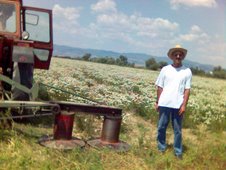Organic farming is more than just farming without chemicals. It involves changes to many parts of the crop and livestock production system. It involves enhanced use of integrated pest, weed and nutrient management techniques. Crop rotations, cover crops, improved genetics, optimum populations, stress management and sanitation are all examples of this. These preventative measures to enhance plant and herd health are essential since many of the chemical tools for pest and disease control are not used in organic production. Organic farmers chose not to use synthetic pesticides, fertilizers and antibiotics.
Producers should consider their transition to organic carefully and plan their options. Making the transition too quickly can create financial hardship. During the first years of the transition there are few premiums for transitional organic product and yields will be decreased initially, and then with good management will improve to profitable levels. Profits in organic may also depend on the availability of market premiums.
The transition to organic will take several years depending on commodity and on your approach to make various challenges. The requirements for organic certification must also be considered throughout the process of transition.
One should also evaluate their reasons for making changes. What are your goals - hobby or a profitable business? There are many assets that you will require to become a successful organic farmer. Here are a few.
Tuesday, April 17, 2007
Subscribe to:
Comments (Atom)

